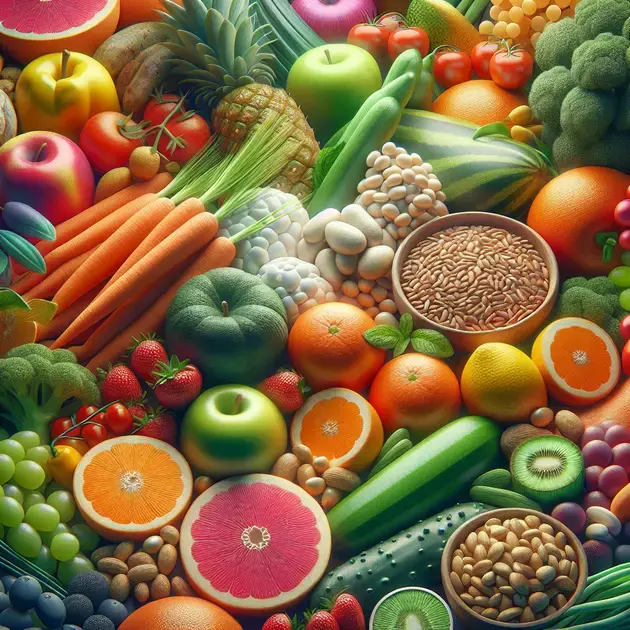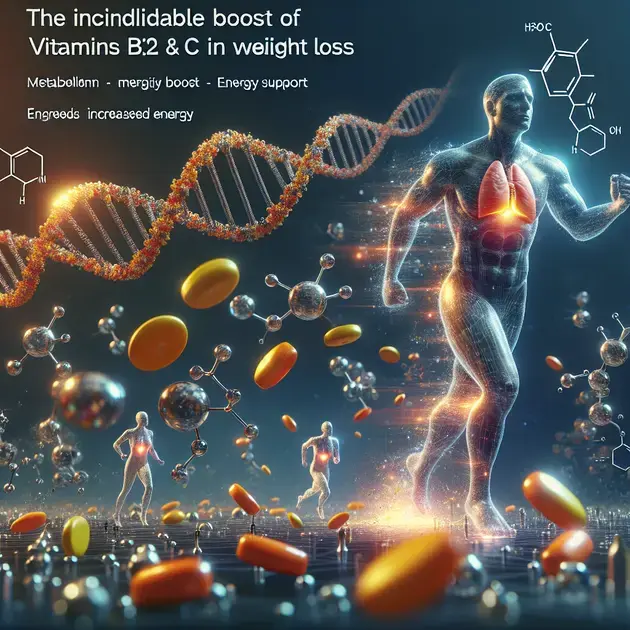When it comes to losing weight, incorporating the right vitamins into your diet can make a significant difference in your journey. Vitamins That Assist in Weight Loss play a crucial role in boosting your metabolism, supporting energy levels, and aiding in the breakdown of fats.
Recent studies have shown that certain vitamins such as Vitamin B12, Vitamin D, and Vitamin C can actively contribute to weight loss efforts when combined with a balanced diet and regular exercise routine. Understanding how these vitamins function in your body can help you achieve your weight loss goals more effectively.

Vitamins That Assist in Weight Loss: An Overview
Vitamins play a crucial role in our overall health and well-being, including weight management. Understanding which vitamins can assist in weight loss can be beneficial for those looking to shed some extra pounds. Here is an overview of essential vitamins that can aid in weight loss:
Vitamin B
Vitamin B complex, which includes B1, B2, B3, B5, B6, B7, B9, and B12, is important for metabolism and energy production. Sources of Vitamin B12 include animal products like meat, fish, and dairy. To ensure an adequate intake of Vitamin B12, consider using apps like MyFitnessPal or Cronometer to track your daily food consumption.
Vitamin D
Vitamin D deficiency has been associated with weight gain and obesity. Spending time outdoors in the sun is a natural way to increase Vitamin D levels. Alternatively, you can use supplements or fortified foods. Apps like D-Minder can help you track your sun exposure to ensure you’re getting enough Vitamin D.
Vitamin C
Vitamin C is essential for the production of carnitine, a compound that encourages your body to turn fat into energy. Citrus fruits, strawberries, and bell peppers are excellent sources of Vitamin C. Consider using apps like Nutrients to monitor your daily intake of Vitamin C and other essential nutrients for weight loss.
The Role of Vitamin B12 in Weight Management
Vitamin B12 is a water-soluble vitamin that plays a key role in the normal functioning of the brain and nervous system. In terms of weight management, Vitamin B12 can boost metabolism and aid in the conversion of fats and proteins into energy. Here is a detailed look at how Vitamin B12 contributes to weight management:
Food Sources
Animal products such as meat, fish, and dairy are the primary dietary sources of Vitamin B12. For vegetarians and vegans, fortified foods like cereals and plant-based milk alternatives can provide Vitamin B12. Apps like Fooducate can help you identify Vitamin B12-rich foods while grocery shopping.
Supplements
If you have a Vitamin B12 deficiency or follow a plant-based diet, consider taking Vitamin B12 supplements. Options include cyanocobalamin or methylcobalamin supplements. Using apps like 1mg or Walgreens can assist you in purchasing the right Vitamin B12 supplement for your needs.
Monitoring Levels
Regular blood tests can help monitor your Vitamin B12 levels. Consult with your healthcare provider to determine the appropriate frequency for testing. Apps like MyQuest allow you to schedule and receive results for Vitamin B12 blood tests conveniently.
Unlocking the Benefits of Vitamin D and Vitamin C for Weight Loss
Vitamins D and C are essential nutrients that offer various benefits for weight loss and overall health. Understanding how these vitamins work can help you optimize your weight loss journey. Here are the key benefits of Vitamin D and Vitamin C for weight loss:
Vitamin D Benefits
Vitamin D plays a crucial role in calcium absorption, immune function, and inflammation regulation. Sun exposure, fortified foods, and supplements are common sources of Vitamin D. Use apps like UVLens to track UV index levels and optimize your sun exposure for adequate Vitamin D synthesis.
Vitamin C Benefits
In addition to its antioxidant properties, Vitamin C is essential for collagen production and the metabolism of fats. Including Vitamin C-rich foods like oranges, kiwis, and broccoli in your diet can support weight loss efforts. Consider using apps like Carrot for meal planning ideas that incorporate Vitamin C-rich foods.
Combining Vitamins D and C
Both Vitamin D and Vitamin C work synergistically to support your immune system and overall health, which can indirectly impact weight loss. Ensure you consume a balanced diet that includes adequate amounts of both vitamins. Apps like MyPlate can help you track your daily intake of Vitamin D and Vitamin C to achieve your weight loss goals.

Effective Vitamins for Boosting Metabolism
Vitamins play a crucial role in boosting metabolism and promoting overall health. Among the most effective vitamins for enhancing metabolism include Vitamin B complex, Vitamin C, and Vitamin D. These vitamins help convert food into energy, regulate metabolism, and support various bodily functions that contribute to weight management.
Vitamin B complex, including B1, B2, B3, B5, B6, B7, B9, and B12, is essential for converting carbohydrates into glucose, which is used to produce energy. This group of vitamins also plays a key role in metabolizing fats and proteins, supporting a healthy metabolism.
Vitamin C is known for its antioxidant properties, which help combat oxidative stress and inflammation in the body. By reducing oxidative stress, Vitamin C supports a healthy metabolism and may aid in weight management. Additionally, Vitamin C is involved in the production of carnitine, a compound that helps the body convert fat into energy.
Vitamin D is crucial for regulating metabolism and maintaining optimal body composition. Adequate levels of Vitamin D have been associated with a higher metabolism and improved weight management. This vitamin also plays a role in reducing inflammation and supporting overall health.
In conclusion, incorporating Vitamin B complex, Vitamin C, and Vitamin D into your daily routine can help boost metabolism, support weight management, and promote overall health.
The Impact of Vitamin E on Fat Oxidation
Vitamin E is a powerful antioxidant that plays a significant role in fat oxidation and metabolic processes. This essential vitamin helps protect cells from damage caused by free radicals and oxidative stress, which can impact metabolism and overall health.
One of the key functions of Vitamin E is its ability to support fat oxidation, which is the process of converting stored fat into energy. By enhancing fat metabolism, Vitamin E may contribute to weight management and improved energy levels.
Research suggests that Vitamin E may help increase the body’s ability to use fat for energy production during exercise, potentially enhancing athletic performance and promoting weight loss. This vitamin also has anti-inflammatory properties, which can further support metabolic health.
When combined with a balanced diet and regular physical activity, Vitamin E can play a role in promoting fat loss, improving metabolic function, and supporting overall health. Including Vitamin E-rich foods such as nuts, seeds, and leafy greens in your diet can help ensure you are getting an adequate intake of this essential vitamin.
In conclusion, Vitamin E is a valuable nutrient for fat oxidation, metabolic health, and overall well-being. Incorporating Vitamin E into your daily regimen can support your weight management goals and enhance your body’s ability to use fat for energy.
How Vitamin A Supports a Healthy Weight
Vitamin A is a fat-soluble vitamin that plays a vital role in supporting a healthy weight and overall well-being. This essential nutrient is involved in various bodily functions, including vision, immune function, and cell growth, all of which can impact metabolism and weight management.
One of the key ways Vitamin A supports a healthy weight is by regulating gene expression and cellular processes involved in metabolism. This vitamin plays a role in the production of thyroid hormones, which are essential for maintaining a healthy metabolism and energy balance.
Research suggests that Vitamin A deficiency may lead to metabolic complications and weight gain. By ensuring an adequate intake of Vitamin A through a balanced diet rich in foods like liver, carrots, and sweet potatoes, you can support metabolic health and weight regulation.
Vitamin A also plays a role in promoting proper immune function, which is essential for overall health and well-being. A strong immune system can help reduce inflammation, support metabolic processes, and contribute to maintaining a healthy weight.
In conclusion, Vitamin A is a crucial nutrient for supporting a healthy weight, metabolism, and overall wellness. Including Vitamin A-rich foods in your diet can help you maintain optimal levels of this essential vitamin and support your weight management goals.
Conclusion
As discussed in this comprehensive guide, vitamins play a crucial role in boosting metabolism and supporting overall health. Vitamin B complex, Vitamin C, Vitamin D, and Vitamin E each offer specific benefits that contribute to metabolic processes and weight management.
Vitamin B complex is essential for converting carbohydrates into energy, metabolizing fats and proteins, and supporting a healthy metabolism. Vitamin C acts as a powerful antioxidant, reducing oxidative stress and aiding in weight management by facilitating the conversion of fat into energy.
Vitamin D plays a crucial role in regulating metabolism and maintaining optimal body composition, while Vitamin E supports fat oxidation and metabolic functions. Incorporating these vitamins into your daily routine through a balanced diet can help boost metabolism, promote weight management, and enhance overall well-being.